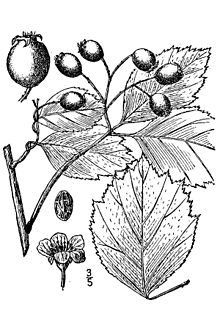Crataegus douglasii
| Crataegus douglasii | |
|---|---|

| |
| Scientific classification | |
| Kingdom: | |
| (unranked): | |
| (unranked): | |
| (unranked): | |
| Order: | |
| Family: | |
| Genus: | |
| Section: | |
| Series: | |
| Species: | C. douglasii
|
| Binomial name | |
| Crataegus douglasii | |

| |
| Natural range of Crataegus douglasii | |
| Synonyms | |
|
C. brockwayae Sarg.[3] | |
Crataegus douglasii is a North American species of hawthorn known by the common names black hawthorn and Douglas' thornapple. It is named after David Douglas, who collected seed from the plant during his botanical explorations.
This thorny shrub is native to northern and western North America, where it grows in varied habitats from forest to scrubland. It is most abundant in the Pacific Northwest.
Description
Crataegus douglasii is a compact erect bushy shrub covered in fan-shaped green leaves with teeth along the distal margin. Thorns along the branches are one to two centimeters long.
White flowers with greenish centers grow in bunches at the ends of each thin branch. The fruit is a very dark purple pome up to about a centimeter across. The fruits were a good food source for Native American peoples such as the Cheyenne and Nlaka'pamux.
Formerly place here
- Crataegus douglasii var. duchesnensis is now considered to be a synonym of Crataegus saligna.
Images
-
Straight, stout thorns are one to two centimeters long.[5]
-
The white flowers have greenish centers.
-
The leaf margin is toothed and usually slightly lobed.
-
The mature bark is grey and rough.[6]
See also
References
- ^ Phipps, J.B., O’Kennon, R.J., Lance, R.W. (2003). Hawthorns and medlars. Royal Horticultural Society, Cambridge, U.K.
- ^ TROPICOS entry for series Douglasianae
- ^ Kruschke, E.P. (1965). Contributions to the taxonomy of Crataegus. Milwaukee Public Museum Publications in Botany. 3: 11–273.
- ^ Phipps, J.B. (1995). The identity of Crataegus columbiana and its relationship to C. piperi (Rosaceae). Taxon. 44(August): 405–408.
- ^ "Crataegus douglasii". WTU Herbarium Image Collection. Burke Museum, University of Washington. Retrieved 2009-12-12.
- ^ Pojar, Jim; Andy MacKinnon (1994). Plants of the Pacific Northwest. Lone Pine Publishing. p. 73. ISBN 1-55105-042-0.

![Straight, stout thorns are one to two centimeters long.[5]](http://upload.wikimedia.org/wikipedia/commons/thumb/0/0a/Crataegus_douglasii_9816.JPG/80px-Crataegus_douglasii_9816.JPG)


![The mature bark is grey and rough.[6]](http://upload.wikimedia.org/wikipedia/commons/thumb/f/f4/Crataegus_douglasii_mature_bark.jpg/104px-Crataegus_douglasii_mature_bark.jpg)